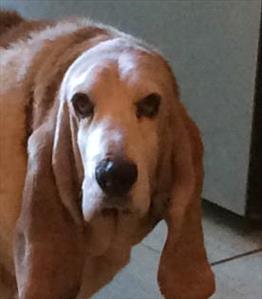basset Dave Elsner

Photo by Dave Elsner
I’d venture to say that almost every veterinarian has been asked at least once in their career: “What would you do if this was your own pet, doc?” In veterinary school, many of us were taught to avoid answering the question. So we have developed a few common responses, such as “I can’t make any decision for you; that’s really up to you,” or “Only you know what’s right.”
But over the years, I’ve come to a place where I no longer dread the question. I try to answer as honestly and completely as possible, since many of my clients believe that my years in practice have provided experience that might be helpful to them. I have come to hear the question as one based on trust and so I feel privileged to engage with them in that conversation. In some situations, I give my clients permission, as it is, not to go further with treatments; in others, I encourage them to pursue additional diagnostics, always conscious of the need to balance the desire to help with the realities of personal finances, time, and the effort that will be involved. Just because we can do something doesn't mean we have to do it, and I try to make sure that my typically very engaged clients don’t over-extend themselves financially or emotionally. In doing so, I attempt to avoid buyer’s remorse and regret.
I fully admit that my care choices for my own dogs and cats have been varied. Many years ago we had a basset hound, the fabulous Patsy Cline, who was found to have a tumor on her pericardium, the sac around the heart. She was about seven years old at the time of diagnosis, in robust health, and was also the kind of dog that took all things in stride. She had extensive testing, including a spinal CT at a veterinary teaching hospital, and then the tumor was removed during surgery that required her chest to be opened. Patsy lived to 14 years of age and I never once regretted the decision that I made to go all-out for her.
Then there was Ralph, my beloved longhaired tuxedo cat, who in the course of his 15 years on the planet had one surgery to remove his spleen, which was filled with mast cell tumors; and then several years later had a second surgery to remove part of his lung for another tumor type. Like Patsy, Ralph went through life without an anxious thought, rocked and rolled through thick and thin, and weathered both surgeries well and the chemotherapy following his first surgery. Ralph didn’t skip a beat.
However, with other animal companions I decided not to pursue the best that veterinary medicine has to offer. I made those decisions based on a number of factors, including the severity of the disease, the personality of the individual, the intensity of the care, and its cost.
I consider myself to be a proactive veterinarian and I hope that my desire to help a patient and client is always tempered by realism. There is much we can do now as veterinarians, but aggressive and extensive care may not be the best for a particular patient and family.
As I write this, I am living with the sadness of knowing that our smart, happy 12-year-old basset hound Daphne has an aggressive nasal tumor. She had surgery in early October to remove the tumor and I carefully weighed the oncologist’s recommendations for follow-up radiation therapy. Daphne simply doesn’t handle anesthesia well and doesn’t eat for days afterwards, during which time she also has a wicked diarrhea that medication doesn’t help. The thought of her having 10 or 18 short anesthetic episodes for radiation therapy and knowing her history with anesthesia made me decide against further treatment. Until the tumor diagnosis, she had not been sick a day in her life and I cannot think about potentially making her ill during the course of radiation therapy.
The tumor will definitely come back, and my husband and I have decided that when she develops symptoms where we can see the tumor has won (nosebleeds), we will allow her to pass away with the gift of humane euthanasia. In the meantime, she is enjoying every bite of her favorite foods; sniffing around the backyard where the rabbits and squirrels hide out; eating doggie ice cream several times a week; and living life to the fullest. She is taking some allopathic and complementary medicines and we are cherishing each day with her. I hope those days are many, but the clinician in me knows they are not. In an ideal world, she would live forever, but we do not live in such a place.
What the experiences and decisions with my own companion animals have helped me understand are my clients’ sadness and anxiety when faced with their pet’s illness. I have been in that same bewildering place of making decisions for further treatment and care too. So when they ask me, “What would you do if he was your own?” I can tell them that care should never be a personal or financial burden to themselves or a series of treatments that an anxious, frightened patient must endure; that the benefit to the patient has to be the most important; and that it’s okay to say we’re not going to go further.
6 Comments
Sharon
January 31, 2017
Paula
January 6, 2017
Angelika Hastings
January 3, 2017
Elizabeth Elser
January 2, 2017
Kenneth Newman
January 2, 2017
Carl Darby
January 2, 2017